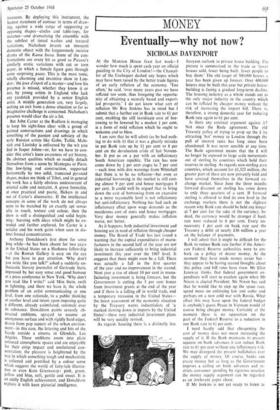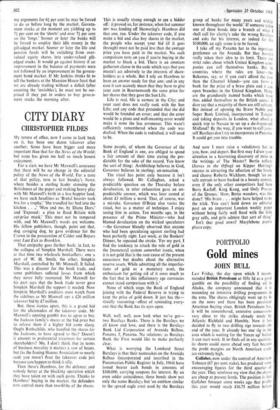Eventually why not now? MONEY
NICHOLAS DAVENPORT
At the Mansion House feast last week—I wonder how much is spent each year on official guzzling in the City of London!—the Chancel- lor of the Exchequer dashed any hopes which may have been raised by the better trade figures of an early reflation of the economy. 'Too often,' he said, `over many years past we have reflated too soon, thus foregoing the opportu- nity of obtaining a securely based and export- led prosperity.' I do not know what sort of reflation Mr Roy Jenkins has in mind but I submit that a further cut in Bank rate to 61 per cent, enabling the still inordinate cost of bor- rowing to be lowered by a modest # per cent, is a form of mild reflation which he ought to welcome and to bless.
I am sure that he will admit (as he had noth- ing to do with it) that it was a ghastly mistake to put Bank rate up by 14 per cent to 8 per cent on the devaluation crisis of last Novem- ber. It put us on a par with an inflationary South American republic. The rate has now come down by I per cent stages to 7 per cent —each time with dire warnings from Whitehall that there is to be no reflation—but even so industrial borrowing in the market is still cost- ing almost 9 per cent and house mortgages 8 per cent. It could well be argued that to bring down the cost of borrowing from an excessive to a more reasonable level is not reflationary but anti-inflationary. Nothing has had such an inflationary effect upon wage demands as the murderous cost of rents and house mortgages. Very dear money generally makes inflation worse, not better.
As it happens, both industrial investment and housing are in need of reflation through cheaper money. The Board of Trade has just issued a warning that the capital expenditures of manu- facturers in the second half of the year are not likely to increase sufficiently to bring industrial investment this year over the 1967 level. It suggests that there might even be a fall. There was actually a fall in the first quarter of the year and no improvement in the second. Next year a rise of about 10 per cent in manu- facturing investment is being forecast, but the Government is cutting the 5 per cent bonus from investment grants at the end of the year and if there is a falling off in world trade, and a temporary recession in the United States— the latest assessment of the economic situation by the Treasury warns industrialists of `a marked slowing down in imports by the United States'—these rosy industrial investment plans will be very quickly revised.
As regards housing there is a distinctly less buoyant outlook in private house building. The picture is summarised in the trade as 'fewer houses sold, fewer being built, fewer people to buy them.' The old target of 500,000 houses a year has been given up forever. Over 400,000 houses may be built this year but private house- building is facing a gradual long-term decline.
The housing industry as a whole stands out as the only major industry in the country which can be reflated by cheaper money without the risk of increasing the import bill. There is, therefore, a strong domestic case for reducing Bank rate again to 64 per cent.
Is there any external argument against it? Not since the Basle agreement. The old Treasury policy of trying to prop up the £ by attracting 'hot' money to London through the pull of interest rates has long since been abandoned. It was never sensible at any time.
The Basle agreement means that the £ will no longer be exposed to large scale movements
out of sterling by countries which hold their reserves in sterling. As regards non-sterling area countries, which account for £1,323 million, the
greater part of these are now privately held and have covered themselves in the forward ex- change market. Since June the three months forward discount on sterling has come down to only three quarters of a cent. If forward sterling is allowed to find its own level in the exchange markets there is not the slightest reason why Bank rate should be held any longer at 7 per cent for the sake of the currency. In- deed, the currency would be stronger if bank rate were reduced to 6 per cent. Every un- necessary I per cent on bank rate cost the Treasury a debit of nearly £30 million a year on the balance of payments.
I will admit• that it might be difficult for the Bank to reduce Bank rate further if the Ameri- can Federal Reserve authorities were to em- bark on a policy of dearer money. At the moment they have made money easier but— they appear to be having second thoughts about this policy and bill rates have risen. Mr Eliot Janeway thinks that federal government ex- penditure will start to escalate again when Mr Nixon is elected President. Mr Nixon has said that he would like to step up the space race, spend more on enforcing law and order and perhaps on a new cold war with Russia. What effect this may have upon the federal budget is anybody's guess. Peace in Vietnam would of course bring cheaper money. Certainly at the moment there is no opposition on the part of the Federal Reserve to a reduction in our Bank rate to 64 per cent.
I need hardly add that cheapening the cost of money does not mean increasing the supply of it. If the Bank maintains its present squeeze on bank advances it can reduce Bank rate to 64 per cent without any inflationary risk. We may disregard the present hullabaloo over the supply of money. Of course, banks can create money but as long as the Government imposes a ceiling on bank advances and re- stricts consumer spending by rigorous taxation the money supply argument can be regarded as an irrelevant paper chase.
If Mr Jenkins is not yet ready to listen :o my arguments for 6f per cent he may be forced to do so before long by the market. Govern- ment stocks at the moment are yielding up to 7f per cent on the 'shorts' and over 71 per cent on the 'longs.' Sooner or later the banks will be forced to employ their idle money in the gilt-edged market. Sooner or later the life and pension funds will be switching from over- valued equity shares into under-valued gilt- edged stocks. It would go against history if an improvement in the balance of payments were not followed by an improvement in the govern- ment bond market. If Mr Jenkins thinks fit to tell the bankers at the Mansion House feast that we are already trading without a deficit (after counting the 'invisibles'), he must not be sur- prised if they put in orders to buy govern- ment stocks the morning after.















































 Previous page
Previous page